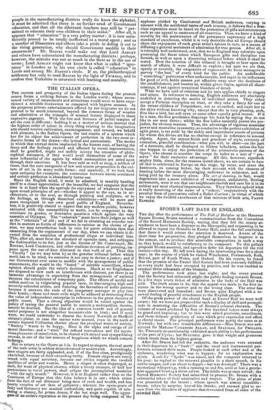SPOHR'S LAST DAYS IN ENGLAND.
Tax day after the performance of The Fall of Babylon at the Hanover Square Rooms, SPOHR received a communication from the Committee of the Sacred Harmonic Society, stating, that they felt the scanty at- tendance to have been a disgrace to the Metropolis, and requesting to be allowed to repeat the Oratorio in Exeter Hall, under the full conviction that there it would attract the attention it deserved. Aware of the short time for preparation, they pledged themselves to improve it to the utmost, and to produce this admirable composition in such a way as, they hoped, would be satisfactory to its composer. To this gallant proposal SPOHR assented, and agreed to defer his departure till the 22d instant—this day. He left town during the intervening time fora short tour ; in the course of which he visited Winchester, Portsmouth, Bath, Bristol, part of South Wales, and Oxford. On his return, he found that the promise of the Exeter Hall Society had been zealously fulfilled: as every night had been occupied by practice, and he was enabled to conduct three rehearsals of the Oratorio.
The performance took place last night ; and the event proved that the Society had estimated aright the public feeling towards SPOHR. In a few days every ticket of admission to the body of the Hall was sold. The truth seems to be, that the appeal was made in the first in- stance in the wrong quarter and to the wrong class. The error has been discovered and remedied; and SPORE quits England with a re- newed feeling of grateful attachment to the English people. Of the great power of the choral band at Exeter Hall we were well aware ; but we were not prepared for such a display of skill and prompti- tude in mastering the difficulties of SPORR'S colossal choruses. The volume of sound produced by four or five hundred voices must always be grand and imposing ; but to this were added precision, smoothness, and those delicate gradations of tone which give expression and effect to choral music. The principal performers were partly the same as at Norwich ; but with two remarkable differences—Miss BIRCH was sub- stituted for Madame CARADORI ALLAN, and STAUDIGL for PHILLIPS. Mr. PHILLIPS unquestionably exhibited much ability in his performance of the part of Cyrus ; but STAUDIOL gave it that weight and greatness which result from the highest genius. After Dr. St'HOR had left the orchestra, the audience were arrested in their departure by a " hush !" and the vocal and instrumental per- formers resumed their seats. People looked at each other and at the orchestra, wondering what was to happen ; for no explanation was given. A call for " Spohr " was raised, and the composer returned to his post: he replied to the renewed plaudits in a short speech, in his native tongue, and was about to depart—but was detained ! There was a mysterious whispering, with a running to and fro, until at last a gentle- man appeared bearing a silver salver. The riddle was at once solved : the Sacred Harmonic Society had subscribed to preseut Dr. SPOKE with a substantial token of their admiration and respect. The piece of plate was presented by the bearer ; whose speech was almost inaudible: SPOHR, taken by surprise, bowed his thanks, and seemed glad to es- cape from the thunders of applause that resounded from all sides of the crowded Hall.


























 Previous page
Previous page